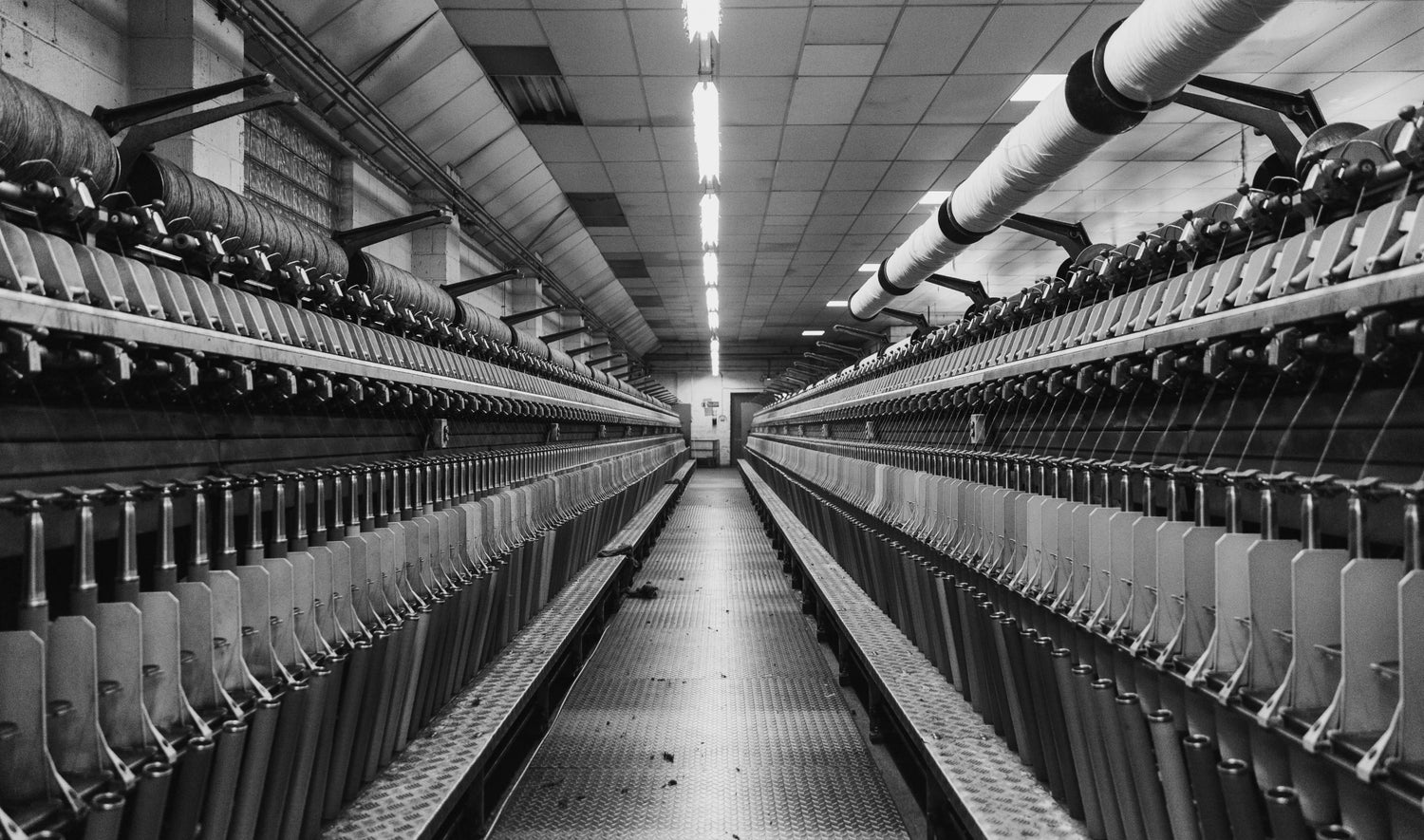A Trip To Mallalieus
Of Delph
We’ve been making exemplary garments for over 127 years in our Manchester factory. Private Jack White himself dedicated his professional career to the manufacturing of British clothing, where patience, skill, attention to detail, steadfast focus and the use of only the highest quality materials typified everything he did.
We continue his legacy today, honouring quality, craft and regionally sourced components - remaining unwavering close collaborators with some of the most venerable weavers in the north of England.
We are blessed to have some of the world’s finest cloth makers and spinners (literally) on our doorstep.
A Trip To Mallalieus Of Delph
We’ve been making exemplary garments for over 127 years in our Manchester factory. Private Jack White himself dedicated his professional career to the manufacturing of British clothing, where patience, skill, attention to detail, steadfast focus and the use of only the highest quality materials typified everything he did.
We continue his legacy today, honouring quality, craft and regionally sourced components - remaining unwavering close collaborators with some of the most venerable weavers in the north of England.
We are blessed to have some of the world’s finest cloth makers and spinners (literally) on our doorstep.
One overcast afternoon, the PWVC team set off to Delph, a quaint, yet striking village nestled alongside the rolling countryside in the Pennine Hills, scattered with picture-perfect cottages and stone brick buildings. Dominating the village, a short 12 miles north-east of our Manchester headquarter, is Valley Mill, home to our lifelong friends, Mallalieus.
They’re synonymous with the most beautiful, luxurious British-made woolen cloths which is no surprise as their weaving origins trace as far back as the late 16th century. To this day can still lay claim to being on of the UK’s last remaining fully vertical mills, controlling every single process required to make luxury fabrics from dying, blending, carding, spinning, weaving and finishing.
According to our Founder James Eden, “cloth making in the UK is Darwinism at its most extreme. If you are still spinning and weaving in England after all these years, it is because you are quite simply the best and not just by British standards. Mallalieus is up there with any weaver, any spinner and any finisher in the world. Of course, it is convenient to be able to jump in the car and be at the mill in 20 minutes, but the principal reason why we collaborate so intensely with Mallalieus is because quite simply, they are the best.”
“You may be familiar with certain heritage mills that market themselves as producers of British made cloths, but what you don’t know is that many outsource nearly all their clothmaking to mills like this one. Mallalieus own, control and oversea the entire cloth making process from sheep to yarn to fabric. They’re the real deal.”
Our trip seemed like good timing, ahead of the launch of our new iteration of the Donegal and Flight Jacket later this year. On site, we were welcomed warmly with open arms (and a can of ‘pop’) by Clive Walsh, Managing Director. He explains what it means to be a truly vertical mill. “We bring wool in one door and we finish fabric all the way through. We spin everything from regular Shetland to cashmere, we then dye it on site here, we blend it, card it, spin the yarn and then those yarns are then made to cloth on site. All the warping, mending, finishing and weaving is all done in-house ensuring a low carbon footprint. There’s no waste.”
“What is unique about us”, Clive continues, “is our proximity and convenient access to water from the River Tame, which runs underneath the building. In this part of the north of England, the limestone makes the water soft, which gives fabric finishing a more luxurious, softer finish.”
We take the water from further upstream; it goes to the draining system and then into the filtration system back into the river. Once it’s filtered you can drink that water it’s that clear.”
Like excited children on an overseas school trip, we were shown around on a wildly impressive plant, split across two sides (one mill on either side of the river) to see for ourselves where the magic and best of British manufacturing happens.
Lisa Holmes, Head of Design, explains: “You need to see this area of the mill because it’s where it all begins, it makes us what we are, we’re very unique.”
What makes Mallalieus even more special is the traditional machinery, some of which dates back to when the factory was set up back in 1863. Clive introduces us to the Decatizing Machine, which processes our exclusive doeskin cloth that we proudly use on our Flight Jacket.
“To my knowledge it’s the only one left in existence in the UK, this technique is done after dying. Doeskin is made with a white ecru yarn, it’s quite a fine yarn. We do a lot of yarns, but yours is of better quality because it goes through this machine, it’s the only cloth in the mill to do so. It’s a high-pressure press that uses heat at the same time, the fabric goes through wet, which gives it that added sheen and softness. It’s quite individual.”
Across the courtyard in the ‘Mending’ room, we were introduced to Andrea who has worked in QC at the mill for nearly 50 years since finishing school. She has dedicated the past five decades to perfecting her craft, a skill requiring immense focus. Andrea and her team painstakingly appraise and assess every single surface, pattern and yarn by touch and by eye. To see such fanatiscism in the quest for perfectly finished fabric is a sight to behold. It is even more staggering when you take stock of the fact that this section is not aided in any way by technology. The quality and end result is all down to the human hand and eye.
Andrea tells us: “I’ve been here since I was 18. It’s very interesting working with different cloths, the more faults there are in the cloth, the better it is for me. I was taught to spot floats, which is essentially missing stitches - you can get one thread which is missing or ten or more, or a bigger hole where it’s missing completely. It’s my job to fix everything, it’s highly skilled. I love it.”
Once Clive had showed us the people, machines, and each individual process with expertise and passion, the coloured wool swatches back in the main office took on a greater significance - a factory visit really does bring you closer to the garments.
Over the coming months, we’ll be delving into the unique heritage and traditional, time-honoured processes implemented here at Valley Mill. With a better understanding of the dyeing, blending, carding, spinning, warping, weaving, mending and finishing processes we are confident that you will start to appreciate just what makes our these woolen & cashmere fabrics so unique and so very special.
With thanks to Clive and his incredible team at at Mallalieus Delph.
One overcast afternoon, the PWVC team set off to Delph, a quaint, yet striking village nestled alongside the rolling countryside in the Pennine Hills, scattered with quaint cottages and stone brick buildings. Dominating the village, a short 12 miles north-east of our Manchester headquarter, is Valley Mill, home to our lifelong friends, Mallalieus.
They’re synonymous with the most beautiful, luxurious British-made woolen cloths which is no surprise as their weaving origins can trace as far back to earlier generations in the late 16th century. To this day can still lay claim to being on of the UK’s last remaining fully vertical mills, controlling every single process required to make luxury fabrics from dying, blending, carding, spinning, weaving and finishing.
According to our Founder James Eden, “cloth making in the UK is Darwinism at its most extreme. If you are still spinning and weaving in England after all these years, it is because you are quite simply the best and not just by British standards. Mallalieus is up there with any weaver, any spinner and any finisher in the world.
Of course, it is convenient to be able to jump in the car and be at the mill in 20 minutes, but the principal reason why we collaborate so intensely with Mallalieus is because quite simply, they are the best.”
“You may be familiar with certain heritage mills that market themselves for producing British made cloths, but what you don’t know is the reality - many of these outsource nearly all their clothmaking. Mallalieus own, control and oversea the entire cloth making process from sheep to yarn to fabric, they’re the real deal.”
“You may be familiar with certain heritage mills that market themselves for producing British made cloths, but what you don’t know is the reality - many of these outsource nearly all their clothmaking. Mallalieus own, control and oversea the entire cloth making process from sheep to yarn to fabric, they’re the real deal.”
Our trip seemed like good timing, ahead of the launch of our new iteration of the Donegal and Flight Jacket later this year. On site, we were welcomed warmly with open arms (and a can of ‘pop’) by Clive Walsh, Managing Director. He explains what that means: “We bring wool in one door and we finish fabric all the way through. We spin everything from regular Shetland to cashmere, we then dye it on site here, we blend it, card it, spin the yarn and then those yarns are then made to cloth on site. All the warping, mending, finishing and weaving is all done in-house ensuring a low carbon footprint. There’s no waste.”
“What is unique about us”, Clive continues, “is our proximity and convenient access to water from the River Tame, which runs underneath the building. In this part of the north of England, the limestone makes the water soft, which gives fabric finishing a more luxurious, softer finish.”
We take the water from further upstream; it goes to the draining system and then into the filtration system back into the river. Once it’s filtered you can drink that water it’s that clear.”
Like excited children on an overseas school trip, we were shown around on a wildly impressive plant that is split across two sites (one mill situated on each side of the river) to see for ourselves where the magic and best of British manufacturing continues to take place.
Lisa Holmes, Head of Design, explains: “You need to see this area of the mill because it’s where it all begins, it makes us what we are, we’re very unique.”
What makes Mallalieus even more special is the traditional machinery, some of which dates back to when the factory was set up back in 1863. Clive introduces us to the Decatizing Machine, which processes our exclusive doeskin cloth that we proudly use on our Flight Jacket.
“To my knowledge it’s the only one left in existence in the UK, this technique is done after dying. Doeskin is made with a white ecru yarn, it’s quite a fine yarn. We do a lot of yarns, but yours is of better quality because it goes through this machine, it’s the only cloth in the mill to do so. It’s a high-pressure press that uses heat at the same time, the fabric goes through wet, which gives it that added sheen and softness. It’s quite individual.”
Across the courtyard in the mending room, we were introduced to Andrea who has worked in QC at the mill for nearly 50 years since finishing school. She’s dedicated five decades to perfecting her craft, a skill requiring immense focus to painstakingly appraise and assess every single surface, pattern, yarn by touch and by eye. It could not be more time-honoured or traditional.
She tells us: “I’ve been here since I was 18. It’s very interesting working with different cloths, the more faults there are in the cloth, the better it is for me. I was taught to spot floats, which is essentially missing stitches - you can get one thread which is missing or ten or more, or a bigger hole where it’s missing completely. It’s my job to fix everything, it’s highly skilled. I love it.”
THE WOOL RANGE
Once Clive had showed us the people, machines, and each individual process with expertise and passion, the coloured wool swatches back in the main office took on a greater significance - a factory visit really does bring you closer to the garments.
Over the coming months, we’ll be delving into the unique heritage and traditional, time-honoured processes used here at Valley Mill in a modern era. From dyeing to blending, carding, spinning, warping, weaving, mending and finishing to understand what makes our woolen fabrics so unique and so very special.
With thanks to Clive and Lisa for making the team so welcome.





Leave a comment
This site is protected by hCaptcha and the hCaptcha Privacy Policy and Terms of Service apply.